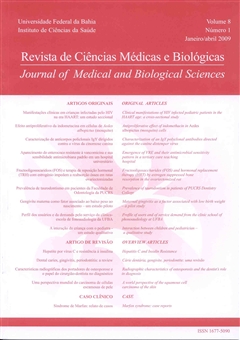Hepatitis C and Insulin Resistance
DOI:
https://doi.org/10.9771/cmbio.v8i1.4378Keywords:
Virus C Hepatitis – Insulin Resistance – Fibrosis – TreatmentAbstract
Chronic infection hepatitis C virus (HCV) infection affects over 200 million people worldwide. Epidemiological data suggest an association between hepatitis C and type 2 diabetes mellitus; the action of the virus C on the glucose metabolism as well as the fibrosing role of the hyperinsulinism have been studied in the last years. The increased prevalence of the type-2 diabetes in hepatitis C virus infection is not exclusively reported for cirrhotic patients. The HCV infection may promote insulin resistance (IR) due to an increased production of Tumor Necrosis Factor alpha (TNF-α), which causes over-expression of the SOCS-3 (suppressor of cytokines substrate) leading to a blockage of the transactivation of GLUT 4 transporter, thus avoiding the glucose subtraction by the cell. The TNF-α was over-expressed in hepatitis due to C virus associated to a more severe fibrosis and the non-response to treatment. Insulin resistance may be also induced by HCV core protein, leading to an increase on the TNF-α. High levels of insulin may directly stimulate the Ito cells mitogenesis and cause an over-regulation of the Connective Growth Factor. It was demonstrated that overweight, hepatic steatosis and IR influence the response to anti-viral treatment with Interferon and Ribavirin, being responsible for the therapeutic failure.Downloads
Download data is not yet available.
Downloads
Published
2009-03-02
How to Cite
Schinoni, M. I., & Oliveira, A. (2009). Hepatitis C and Insulin Resistance. Journal of Medical and Biological Sciences, 8(1), 67–74. https://doi.org/10.9771/cmbio.v8i1.4378
Issue
Section
Review Articles
License
The Journal of Medical and Biological Sciences reserves all copyrights of published works, including translations, allowing, however, their subsequent reproduction as transcription, with proper citation of source, through the Creative Commons license. The periodical has free and free access.


